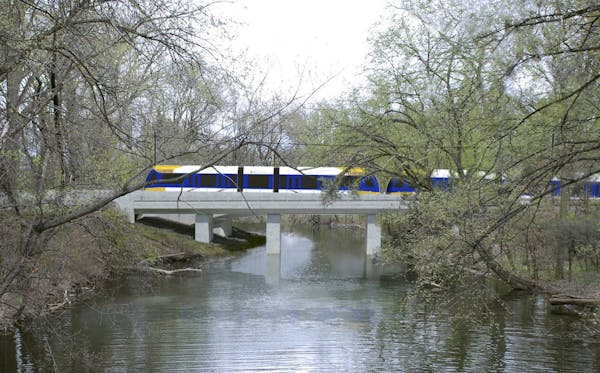Louisa Castner led her rambunctious poodle-mix pup along the Kenilworth corridor in Minneapolis last week as she grimly considered the popular recreational trail's future as a busy transit corridor.
Later this month, builders will begin cutting down more than a thousand trees to make way for the $2 billion Southwest Light Rail Transit project, which will connect Minneapolis to Eden Prairie. The removal of trees and thicket on the trail — long the nexus of the controversy surrounding the Southwest rail project — would be a tangible sign that construction of the largest public works project in Minnesota history is moving forward.
Castner and others decry what they call the impending "clear cutting" and "deforestation" of the Kenilworth corridor. "This trail is sacred space," she said.
The Kenilworth corridor, which divides Cedar Lake and Lake of the Isles, is the most intensely used trail in Minneapolis' park system given its compact size, with some 746,000 annual visits, according to the Minneapolis Park and Recreation Board. It's also home to occasional freight rail service.
In the coming weeks, the Kenilworth trail will be closed for three years to make way for Southwest rail construction. By 2023, some 220 light-rail trains will zip along the corridor and through a tunnel there every day, hemmed in by freight rail service and restored bike and pedestrian trails.
Elected officials and some neighbors this month asked Gov. Tim Walz and the Metropolitan Council to delay the tree removal, noting $929 million in critical federal funding for the Southwest project has not been finalized. A longstanding federal lawsuit seeking to block the project is pending, too.
"In the event that [the Southwest rail project] does not proceed for any reason, elimination of this unique, urban forest preserve and passageway would be a reckless and irreversible mistake," wrote Sen. Scott Dibble and Rep. Frank Hornstein of Minneapolis, along with City Council Member Lisa Goodman and Minneapolis Park Board Commissioners Jono Cowgill, Meg Forney and LaTrisha Vetaw.
The April 12 letter was penned to Met Council Chair Nora Slawik, who rebuffed their request. Any delay could result in an increase in the project's price, delay its opening and imperil its standing with the Federal Transit Administration (FTA), she said.
The prospect of ballooning costs and delays is the council's "go-to thing every time anyone raises any questions," said Dibble, a Democrat from Minneapolis. "I don't necessarily believe it."
The letter to Walz from the Cedar-Isles-Dean and Kenwood neighborhood associations and other local groups was even more pointed: "Why would the state of Minnesota/Met Council destroy one of the most pristine areas of the region until they know for absolute certainty that full federal funding has been approved?"
Money on the line
About half the Southwest project's construction costs are expected to be borne by the federal government. But any cash influx from the FTA typically comes late in the process, sometimes after construction has begun.
Along the way, the FTA gives a hint of what may come. In November, transit planners rejoiced when the FTA sent a "letter of no prejudice" to the Met Council, which will build and operate the Southwest rail. The notice meant federal funding is likely, since no big transit project given such a notice has ever been canceled.
Southwest project director Jim Alexander said federal matching funds on the nearly $1 billion Green Line were finalized two years after construction began. Nine "letters of no prejudice" were issued by the FTA for the Green Line, which began service in 2014.
"The FTA is all about squeezing out [financial] risk as much as possible before signing on the dotted line," Alexander said. "It's a long, arduous process."
Still, Hennepin County and the Met Council have hired Washington, D.C.-based Cardinal Infrastructure LLC to lobby federal funders on behalf of Southwest and the $1.5 billion Blue Line Extension (Bottineau line), which would connect Minneapolis to the northern suburbs.
Cardinal will be paid up to $198,000 for its work.
The Met Council notes bike and pedestrian paths will be restored along the Kenilworth corridor following light-rail construction. In 2015, the Kenilworth Landscape Design Committee crafted a plan to support the area's natural setting and to "visually minimize LRT-related infrastructure," Slawik wrote.
'That ship has sailed'
Some frequent users of the Kenilworth trail have accepted its fate. Nathan Campeau, a civil engineer from Uptown, has used the trail for running and biking for the past 15 years. "I love the space, it's such an oasis in the middle of the city," he said. But at the same time, he supports bolstering public transit in the Twin Cities.
While he would have preferred to have Southwest run through Uptown, Campeau acknowledges there's little likelihood the route will change. "That ship has sailed," he said.
About 800 of 2,100 trees will be retained along the corridor's 44 acres. Another 1,100 new trees will be planted, along with 2,700 shrubs, more than 4,000 perennials and scores of native plants.
Mary Pattock, who heads the Cedar-Isles-Dean Neighborhood Association, doubts the accuracy of the Met Council's tree count and characterizes the council's refusal to pause the "clear cutting" as "intransigence."
"It's so densely forested there you cannot hear city noises, you see deer, coyotes, foxes and birds of all kinds," Pattock said. "People say, 'Well it was a train yard before.' Well, yeah, it was. But this is what nature has given us in the past 50 years, and once it's gone — it's gone."
Janet Moore • 612-673-7752 @MooreStrib

University of Minnesota police arrest 9 after pro-Palestinian encampment set up on campus
2 dead in Lino Lakes, no known threat to public, police say
Teen charged with murder in deadly St. Paul shooting last month

